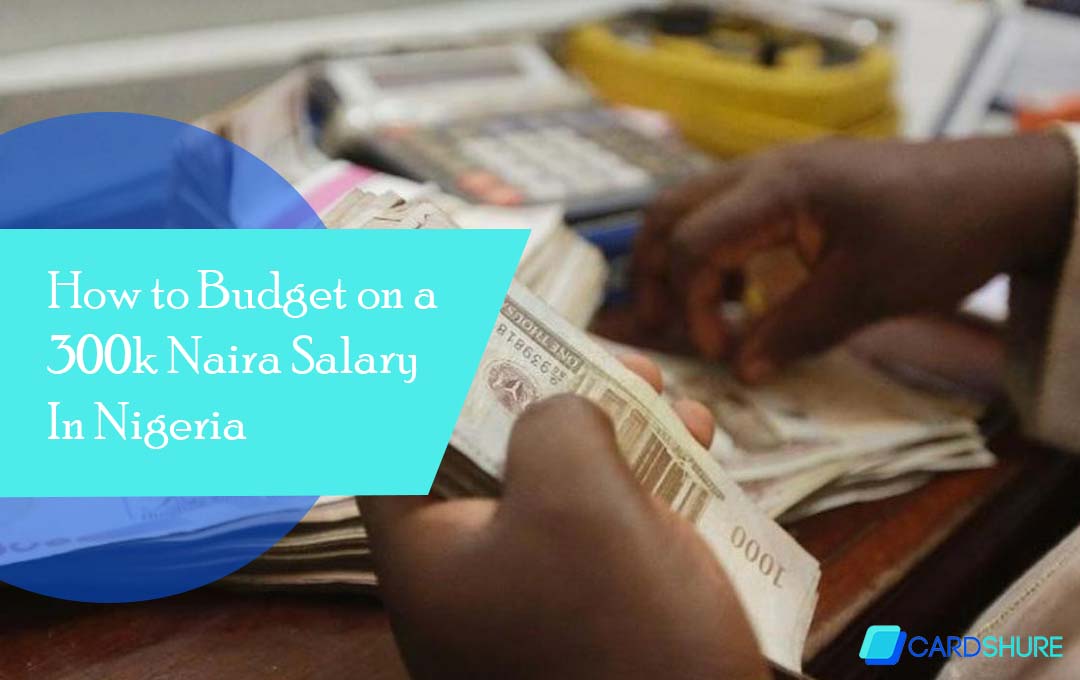Earning around N300,000 currently places you among the top echelon of salary earners. According to the Nigerian Bureau of Statistics NBS, Nigeria’s Minimum wage is N30,000, so an N300,000 salary would place you at least 10 times above the national minimum wage.

To further explain this, we may place the pay structure of the current civil service under consideration. As stated by statistics from the Lagos state government harmonized public service structure HPSS, a grade 14 state worker earns around N325,518 to N457,952.
These are top government officials and earnings anywhere in the region of these salaries would place you way ahead of a lot of civil service and some private sector workers. Earning this amount suggests that anyone gets to live a lavish lifestyle with around N300,000, well the reality is far from that.
Living with N300,000 Per Month in Nigeria
In Nigeria currently, N300,000 per month would enable you to live on average and failure to plan or even budget properly might throw you right into financial trouble.
A Perth partner infographic, shows the reality of living on N300,000 per month and the realities are quite appalling. Let’s say, after spending conservatively and saving for rent, a worker would only be left with nothing more than N15,000 for miscellaneous expenses.
The worst part of the data is the fact that having to invest was not factored in. A worker who is earning around N300,000 would be able to save and pay for their rent, transportation, bills, and more. Without having to put anything aside for investing and still having to live from “hand to mouth”.
Tons of workers who have worked for the statutory for about 35 years in civil service leave the platform with almost no investment running.
It is quite clear that thriving with just an N300,000 paycheck requires a thorough and well-calculated plan to eventually escape the proverbial “rat race”.
How to Budget on a N300,000 Salary
Understanding the Reality of the Situation:
Some salary earners at the moment are yet to realize the severity of the prevailing economic situation in Nigeria. The NBS economic report for August put inflation figures at 24.08% The cost of petrol has surged year on year by around 216%.
In actuality, the purchasing power of the same salary obtained one or two years ago has significantly decreased in the present. Therefore, greater financial caution needs to be used. When someone is aware of the circumstances, they begin to view budgeting as a must, not a choice.
Assess Your Net Income:
Are you aware of your monthly average take-home pay? Certain individuals have fluctuations in these figures due to variations in benefits and allowances throughout the year. But to make a successful budget, you must determine the precise amount you expect to get each month and work with that figure. Budgeting errors may result from assuming unclear statistics or expecting more than is available.
Set a spending limit:
Indeed, the prices of commonplace things vary greatly these days, making it challenging to budget precisely for expenses. Setting a spending limit is the other available option. For instance, if your spending reaches a particular level, you might stop making needless purchases.
Stop reckless spending:
If your goal is to avoid financial ruin, living on an N300,000 wage will inevitably imply that some expenses are out of your reach. Avoiding unforeseen costs is advised. Spend only the money that has been prearranged. Refrain from trying to “keep up with the Joneses” or impress people with your expenditures.
Reduce expenses as much as you can:
If you don’t, it could be quite difficult to make and follow a budget. For example, experts advise that your rent should not exceed thirty percent of your take-home pay. But rather than renting an apartment that consumes thirty percent of your income, you may choose an affordable apartment in an affordable neighborhood or a lower-class property.
Get Professional Financial Help:
For some people, what they need is to see a financial counselor. The job of the counselor/advisor is to help them with identifying financial problems and offer them solutions. A financial advisor might help with identifying bad spending habits or unrealistic savings expectations as the reason for the budgeting difficulty and help you with practicable solutions that would help you improve.
Verdict
If you would be living on, N300,000 monthly, you might need to adopt a prudent financial plan just to be on the safer side.
